You can install an ENOVIA VPM Product Editor on the same machine or on a different workstation from the server and which does not contain any server code.
The screen captures in this section illustrate the case where the ENOVIA VPM Product Editor is installed on a different machine from the server. If you install the client on the same machine as the server, the dialogue will be the same as for installing an additional product.
- Orbix must be running on the server machine
- the database must be running on the server machine.
If Orbix is not running, run the following command:
C:\Program Files\Dassault Systemes\B18\intel_a\code\bin\runOrbix
Installing the ENOVIA VPM Product Editor Client
- Log on as an administrator.
You must belong to the Administrators group, or have the privileges assigned to the Administrators group. Otherwise, you will not be able to start the installation.
- Insert the CD-ROM into the drive.
The Welcome dialog box is then displayed on a background window. Note that the screenshots illustrating the installation procedure were taken without the background window:
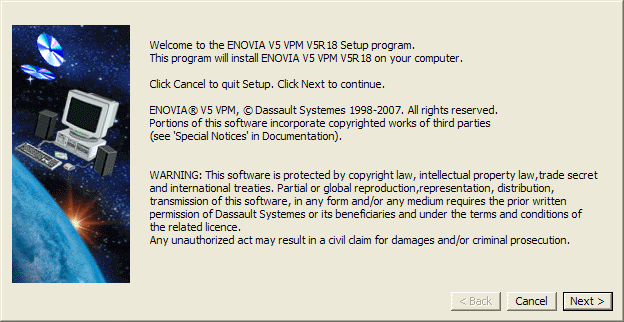
- Click the Next button to move to the next step.
The Choose Destination Location dialog box appears. A default destination folder is already proposed:
C:\Program Files\Dassault Systemes\B18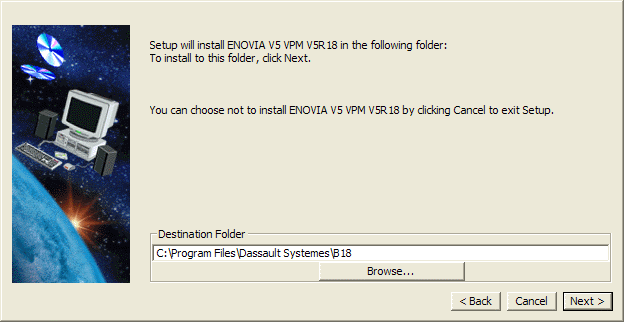
- If the default destination folder is suitable, click the Next button
to move to the next step, or click the Browse... button and navigate to
select another folder and click OK.
The folder you choose must be empty. You can also specify a new folder: if the folder does not exist, you will be prompted to specify that you want the folder to be created, in which case you must click the Yes button to create the folder.
Installing Several Identical Releases in Different Locations on the Same Computer
Providing you have enough disk space, you can now install several identical releases in different locations on the same computer.
For example, you may want to install the same V5R18 GA release in two places. Your first installation could be, for example, the production version. Then, once a V5R18 service pack becomes available, you could apply it to the second installation which would then become the test version, enabling you to test it before it becomes the official production version.
Furthermore, the different releases you can install can belong either to the same product line, or to different product lines. For example, you could install CATIA V5R18 and DELMIA V5R18 in different locations.
To install another identical release, when you reach the Choose Destination Location dialog box, this time click the Browse... button, specify the new destination folder, then click OK. You will be prompted to create the folder if it does not already exist, so click Yes.
Click Next to display the dialog box entitled Enter Ident for your new installation:
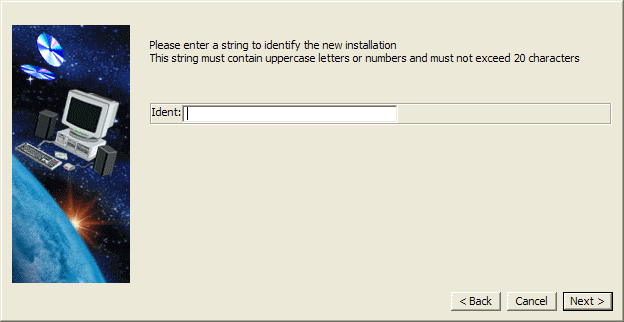
Enter an identifier which will enable you to identify all the components of your new installation. The string must contain uppercase characters or numbers, and must not exceed 20 characters.
The identifier for your new installation is preceded by an underscore and is visible:
- in the installation path
- in the environment name
- in the appropriate registry entries
- in the Start->Programs->MyProductLine menu, and new
entries for the corresponding tools are created in the Start->Programs->MyProductLine->Tools
- in the Add/Remove Programs control.
If identical releases belonging to the same product line are installed, the OLE behavior is the same for both. However, if the installations involve different product lines, the OLE behavior registered for the last installation takes priority.
- Click the Next button to move to the next step.
The Choose Environment Location dialog box appears:
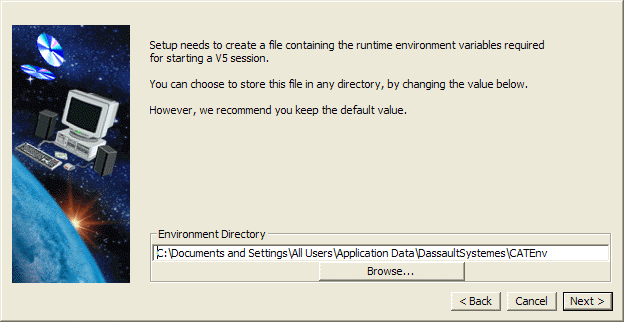
A default destination folder is already proposed:
C:\Documents and Settings\All Users\Application Data\DassaultSystemes\CATEnv
- If the default folder is suitable, click the Next button to move to
the next step, or click the Browse... button and navigate to select
another folder and click OK.
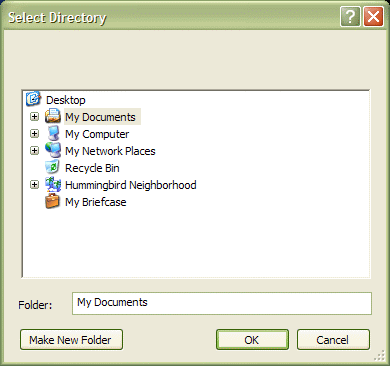
The folder you choose must be empty. You can also specify a new folder: if the folder does not exist, you will be prompted to specify that you want the folder to be created, in which case you must click the Yes button to create the folder.
For more about environment files, refer to About the Environment Created on Your Computer on Windows.
- Click the Next button to move to the next step.
The Setup Type dialog box appears:
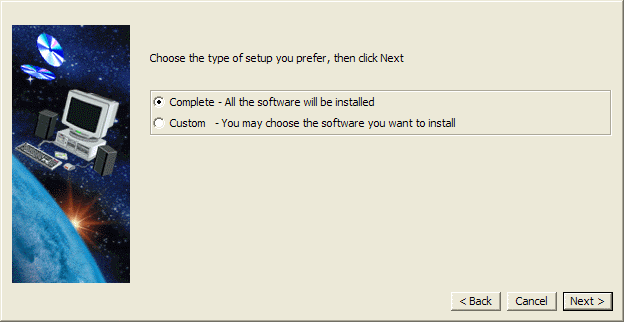
This dialog box lets you specify whether you want to install all of the software on the CD-ROM, or select the configurations and/or products to be installed:
- Complete: specifies you want to install all the software, and moves on to the next installation step (installation of online documentation files) when you click Next
- Custom: lets you choose the configurations and/or products to be
installed.
- If you want to choose which configurations and/or products to
install, check the Custom option and click the Next button to move to the
next step.
The Install Language-Specific Files and Fonts dialog box appears:
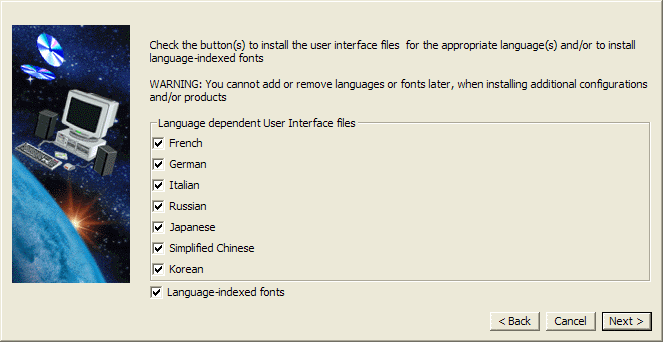
Check the buttons to install the user interface files for the appropriate language(s) and/or to install language-indexed fonts. Uncheck the buttons for the language files you do not want to install. This will let you skip the installation of unnecessary language files and fonts and enable you to save disk space.
Note that the choice you make at installation is definitive: you cannot add or remove languages or fonts later when installing additional configurations and/or products.
- Click the Next button to move to the next step.
The Select Software dialog box appears:
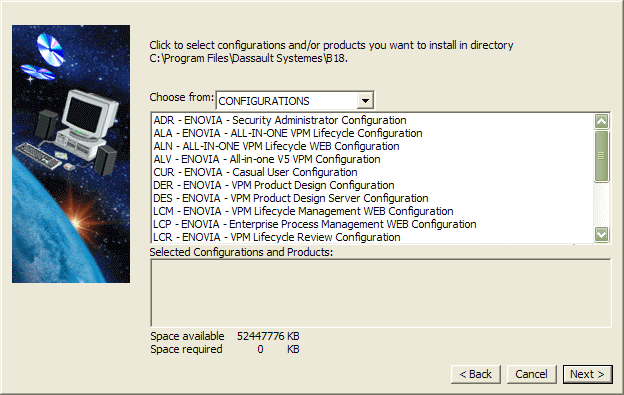
- In the Choose from: list, select PRODUCTS:
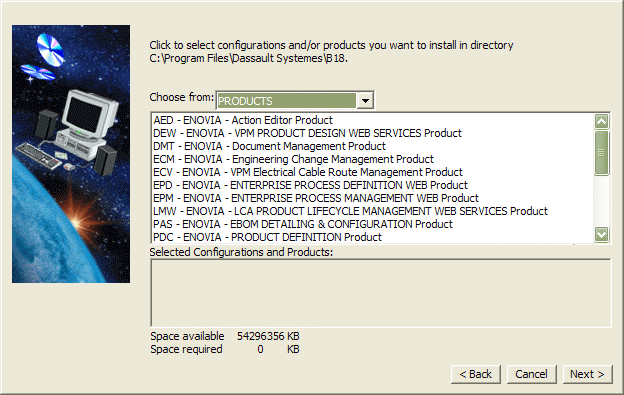
- Select
VPC - ENOVIA Client Product.The VPC - ENOVIA Client Product is indicated in the Selected Configurations and Products list:
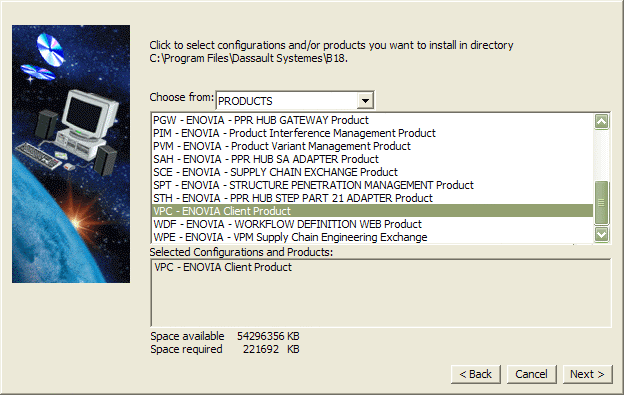
- Click the Next button to move to the next step.
If you chose a complete installation, or a custom installation and chose all the configurations in the list, the CATIA V5 - ENOVIA V5 VPM Interoperability Information dialog box appears:
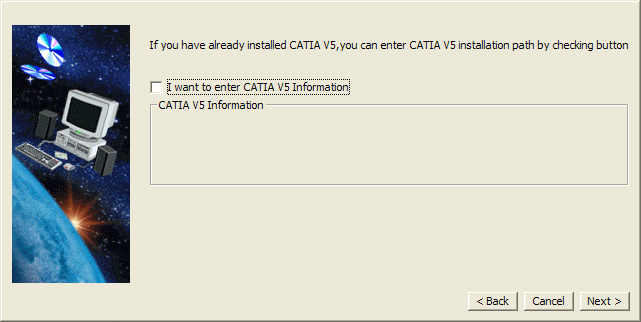
- If you already installed CATIA V5, check the I want to enter CATIA
V5 Information button to enter information about your CATIA V5
installation:
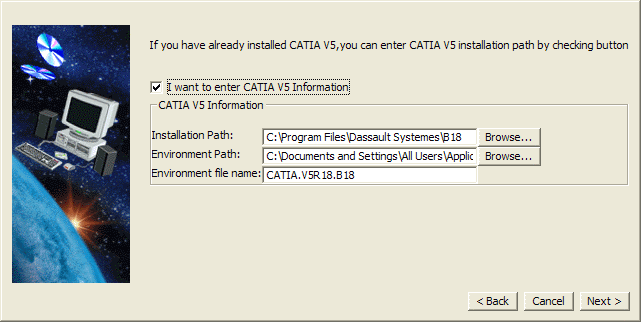
- Enter the CATIA V5 installation path, environment file folder, and environment file name.
- Click the Next button to move to the next step.
If your configuration requires you to configure Orbix, the Choose Orbix Configuration dialog box appears:
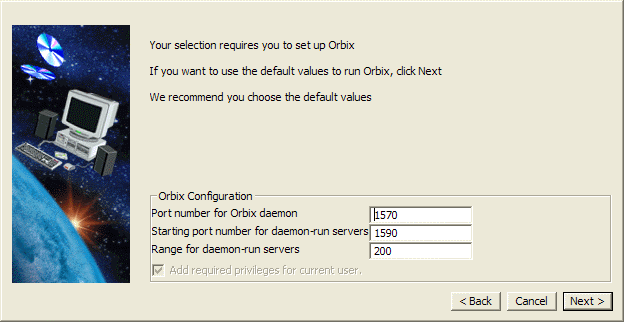
Leave the default values as is for Orbix.
The installation procedure checks that the administrator performing the installation has the correct privileges required for running Orbix and the server manager. Note that the option "Add required privileges for current user" is grayed out, which means that the privileges are correct. If the privileges are not correct, the option will be accessible. Check the option before proceeding with the installation to add the required privileges to the administrator user performing the installation. If not, the installation will fail.
- Click the Next button to move to the next step.
The Server Timeout Configuration dialog box is displayed:
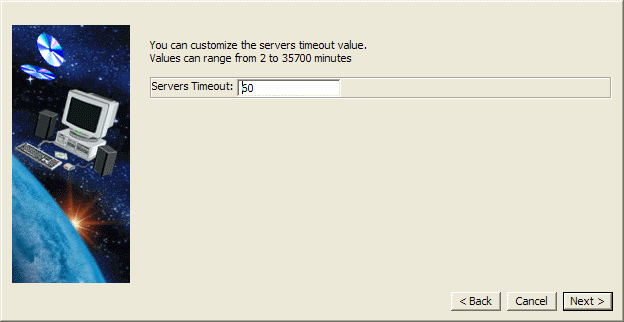
Set the timeout value as described in Server Timeout.
- Click the Next button to move to the next step.
The Choose Communications Ports dialog box is displayed:
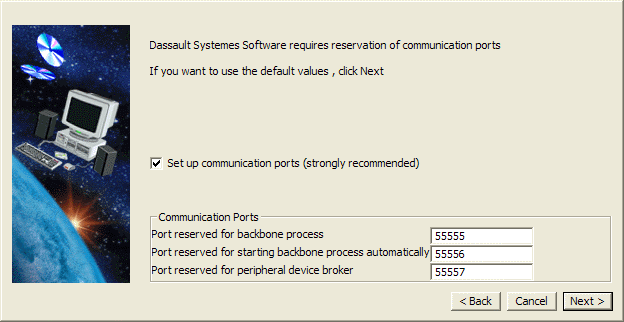
This allows you to set up on your computer:
- a port reserved for the communications backbone process
- a port reserved for starting the communications backbone process automatically
- a port reserved for processing events when using peripheral devices (spaceball, spacemouse, joystick).
By default, the "Set up communication ports" option is checked because it is strongly recommended.
A backbone daemon is created as a service and started. You can monitor the daemon by selecting
Start->Control Panel->Administrative Tools->Services. The name of the service isBackbone Service. The name of the executable program that corresponds to the backbone service isCATSysDemon.exe, which you can track using the Task Manager.This installation step adds three lines to a system file. For more information about the communications backbone and which file is concerned, refer to Communications Backbone Files.
In previous releases, the Choose Communications Ports dialog box always appeared. Now, the installation setup analyses the file in question. If the three lines are present (for example, due to a previous installation), the dialog box will not appear.
Furthermore, if the backbone service is already running, it is stopped then restarted. You can check which services are running by selecting the
Start->Control Panelcommand and selecting theServicescontrol. - Click the Next button to move to the next step.
The Vault Client Configuration dialog box is displayed:
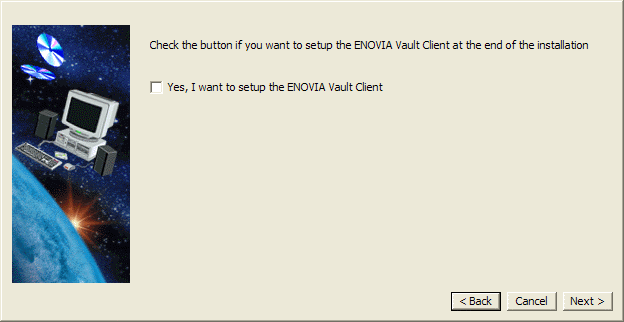
When installing a product which contains a potential vault client, this dialog box prompts you to indicate if you want to configure a vault client at the end of the
enoviadbsetupprocess.If you choose to configure a vault client, another dialog box will be displayed at the end of the installation, allowing you to enter the parameters of the vault server(s) you want to catalog: vault name, machine name, orbix port and orbix service name. This information is added in the
VaultClient.propertiesfile.After installation, you can run the VaultClientSetup command, in order to catalog another vault server, modify the parameters of an existing one, or remove an existing one.
The VaultClientSetupB command provides the same functionalities in batch mode.
- Check the appropriate option if you want to set up the vault client
at the end of the installation.
- Click the Next button to move to the next step.
The Data directories selection dialog box appears. In the Please Enter Java Home Path field, enter the complete Java runtime path:
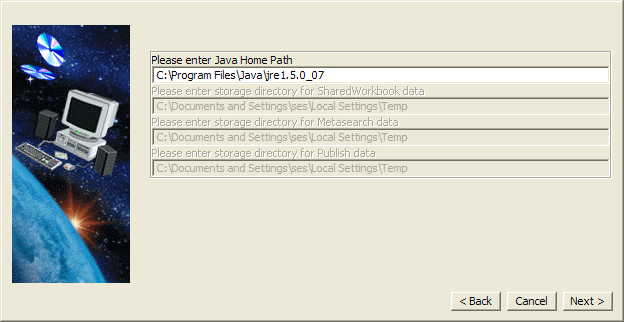
- Click the Next button to move to the next step.
The Shortcut Creation dialog box appears:
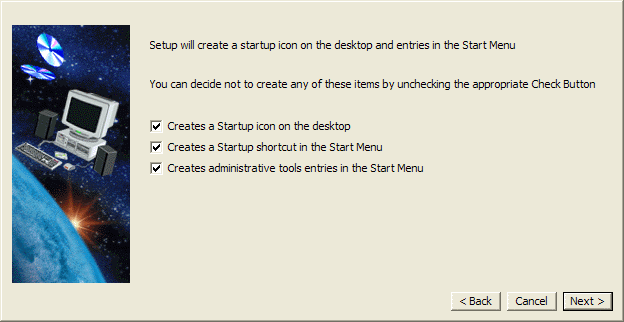
This dialog box gives you the choice whether to create:
- a startup icon on the desktop
- a startup shortcut in the Start menu
- entries in the Start menu for the administration tools.
Not installing the desktop shortcuts allows you to minimize the number of registry entries during the installation.
Check the appropriate options.
- Click the Next button to move to the next step.
The Select ENOVIA V5 VPM V5R18 Documentation dialog box appears:
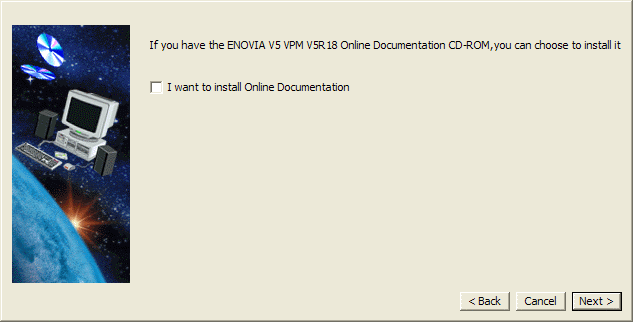
-
Check the I want to install Online Documentation check box only
if you want to install the online documentation: this choice is
optional.
If you check this box, you will be prompted later on in the installation (after the software has been copied to your computer) to remove the code CD-ROM and insert the first documentation CD-ROM.
- Clicking the Next button displays the Start Copying Files
dialog box.
The central area lists the current settings you set in the previous steps:
- the product names and documentation
- destination folder.
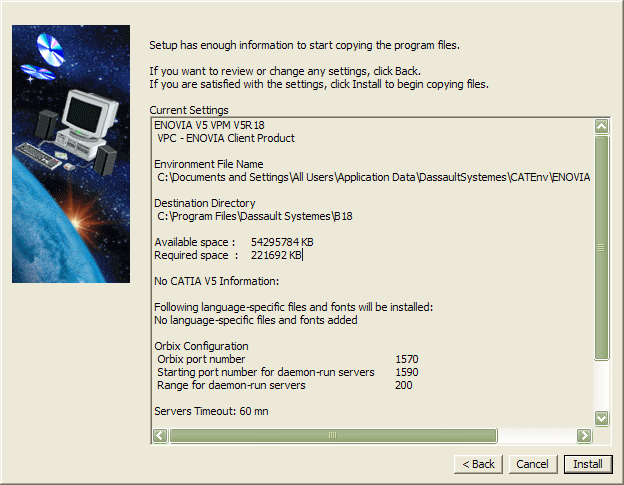
- Click the Install button to start copying the files to your computer.
- If you indicated earlier that you want to set up a vault client, the
Vault Client Setup dialog box appears:
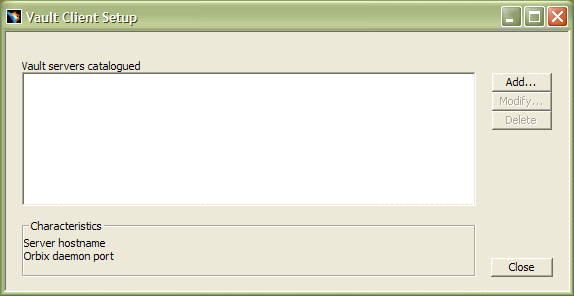
You are prompted to enter the parameters of the vault server(s) you want to catalog: vault name, machine name, orbix port and orbix service name. This information is added to the VaultClient.properties file.
- Click the Add... button to display the following dialog box:
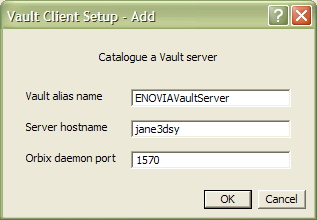
- Specify the Alias name, server hostname and Orbix daemon port, then
click OK.
The Vault Client Setup dialog box is now updated like this:
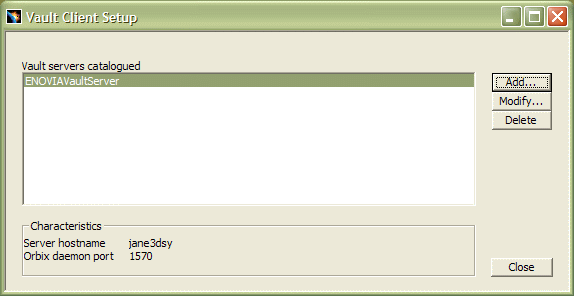
- Use the Modify... and Delete buttons to modify or delete the selected configuration.
- Click the Close button to continue.
Once the files have been installed, the Setup Complete dialog box appears:
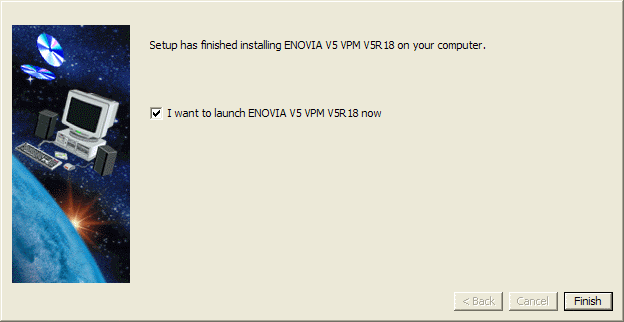
- Click the Finish button to end the installation.
![]()